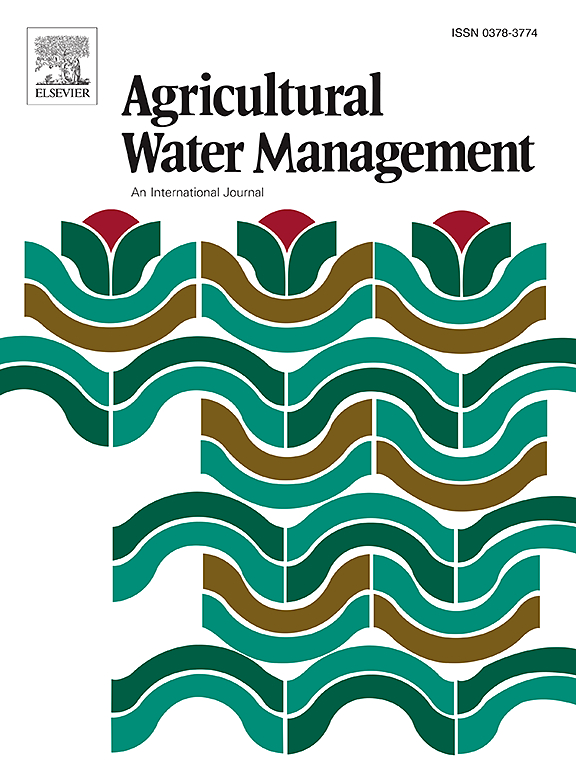生物炭通过改善盐碱地的孔隙结构增强土壤的水文功能
IF 5.9
1区 农林科学
Q1 AGRONOMY
引用次数: 0
摘要
盐碱化造成的土壤结构不良是影响作物生长的主要因素,而土壤结构又会进一步影响水文功能。生物炭因其特殊的多孔性材料而被广泛用于改善土壤物理结构。然而,在盐碱土壤中掺入生物炭后,土壤孔隙结构对水文功能(如土壤饱和导水率、植物可用水量、最小限制水量范围)的影响机制仍不清楚。因此,本研究考察了盐碱粘壤土中不同生物炭添加量对土壤结构特性的影响,并随后评估了孔隙结构对土壤水文功能的影响。研究涉及四个处理:CK(对照)、C1(7.5 吨/公顷生物炭)、C2(15 吨/公顷生物炭)、C3(30 吨/公顷生物炭)。当生物炭添加量从 7.5 吨/公顷增加到 30 吨/公顷时,土壤团聚稳定性从 15% 增加到 30%。生物炭添加量为 30 吨/公顷时,连通指数(2.36)最高,分形维数(2.56)最高。生物炭的添加降低了 0-10 厘米和 10-20 厘米土壤深度的小孔隙(孔径 50 微米)比例,而增加了大孔隙(孔径 300 微米)比例。生物炭添加剂降低了土壤渗透阻力,与 CK 相比,添加 30 吨/公顷生物炭的土壤饱和导水率、植物可用水量和最小极限水量范围分别增加了 46%、27% 和 40%。皮尔逊相关分析和冗余分析表明,土壤饱和导水率与大孔隙(直径 300 微米)和孔隙连通性呈正相关(p <0.05)。CK 的最低最小极限水量范围主要受制于相对较高的渗透阻力。孔隙连通性的改善和孔隙结构的拉长是生物炭改良土壤渗透阻力降低的主要原因,而渗透阻力的降低又增加了最低限度水分范围。这些定量估算强调了生物炭改良引起的土壤孔隙结构变化对改善土壤水文功能的积极作用。这些发现对于制定有效战略,促进盐碱地的可持续农业发展至关重要。本文章由计算机程序翻译,如有差异,请以英文原文为准。
Biochar enhances soil hydrological function by improving the pore structure of saline soil
The poor soil structure caused by salinization is a major factor affecting crop growth and soil structure will further affect hydrological function. Biochar is widely used to improve soil physical structure because of its special porous material. However, the mechanism of soil pore structure on hydrological function (e.g., soil saturated hydraulic conductivity, plant available water, least limiting water range) after biochar incorporation in saline soil remains unclear. Therefore, the present study examined the response of soil structural properties of different biochar addition in saline clay loam, and subsequently assessed how the pore structure influence soil hydrological function. The study involved four treatments: CK (Control)、C1 (7.5 t ha−1 biochar)、C2 (15 t ha−1 biochar)、C3 (30 t ha−1 biochar). Soil aggregate stability increased from 15 % to 30 % when the amount of biochar addition increased from 7.5 t ha−1 to 30 t ha−1. The highest connectivity index (2.36) and the highest fractal dimension (2.56) were found at the biochar addition of 30 t ha−1. Biochar addition reduced the proportion of small pores (<50 µm pore size) at both soil depths of 0–10 cm and 10–20 cm, whereas increased the proportion of large pores (>300 µm pore size). Biochar amendment reduced the soil penetration resistance, with the soil saturated hydraulic conductivity, plant available water and the least limiting water range were measured 46 %, 27 % and 40 % greater in rate of 30 t ha−1 biochar addition as compared with those of the CK, respectively. Pearson’s correlation analysis and redundancy analysis revealed that the soil saturated hydraulic conductivity was positively correlated with large pores (diameter >300 μm) and pore connectivity (p < 0.05). The lowest least limiting water range of the CK was primarily constrained by a relatively higher penetration resistance. The improved pore connectivity and elongated pore structures were the key responsible for the reduced penetration resistance in biochar-amended soil, which subsequently increased the least limiting water range. These quantitative estimates highlight the positive effects of biochar amendment-induced soil pore structure alternations towards improving soil hydrological functionalities. These findings are essential for devising effective strategies to enhance sustainable agriculture in saline soils.
求助全文
通过发布文献求助,成功后即可免费获取论文全文。
去求助
来源期刊

Agricultural Water Management
农林科学-农艺学
CiteScore
12.10
自引率
14.90%
发文量
648
审稿时长
4.9 months
期刊介绍:
Agricultural Water Management publishes papers of international significance relating to the science, economics, and policy of agricultural water management. In all cases, manuscripts must address implications and provide insight regarding agricultural water management.
 求助内容:
求助内容: 应助结果提醒方式:
应助结果提醒方式:


